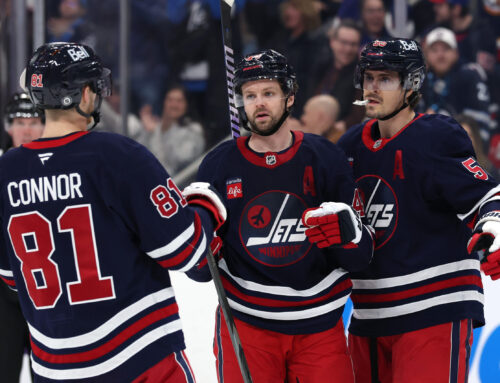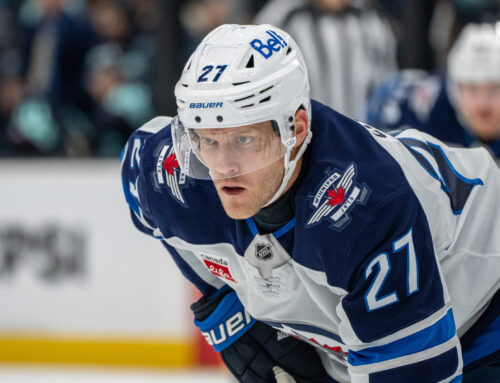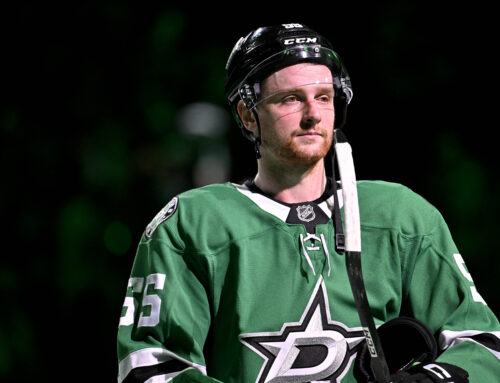
Looking at the three UFA signings in the West with limited fantasy upside – and two more that are just plain bad…
After looking at the best free agent signings from a fantasy hockey perspective this week the focus turns to the worst of the fantasy relevant signings. These signings are largely cases where the player in question moved to a situation that is at best a horizontal move and at worst a significant step backwards. A player may move to a good team, or even a potentially good situation, but it must be measured relative to the situation he is coming from. A player going to a good team from a bad team may not be afforded the same usage as he was on the bad team, good teams have more quality options after all. For high-end players the quality of the power play on the new team and the availability of power play time will be especially important. Furthermore, the propensity of the new to use odd line combinations, maybe even nonsensical, must be considered. For example Patrick Roy loves using Cody McLeod on the power play and as an extra attacker, not to mention that only one line combination saw even close to 300 minutes together on the season.
Limited Upside
Loui Eriksson – Signed in Vancouver
The Canucks signing Eriksson could go very well, but that is almost entirely contingent on him playing with the Sedins. While Eriksson is much better than Radim Vrbata, and his contract gives the Canucks tons of incentive to use him in a prime role, the struggles of Vrbata this past year, in sub-optimal usage, are worrisome. Last year Vrbata played primarily on the second line with Bo Horvat and Sven Baertschi and only managed 27 points. The season before that Vrbata played primarily with the Sedins and finished with 63 points. In Boston there were two good scoring line options as Eriksson could skate with either Bergeron or Krejci that option does not exist in Vancouver, as there is a severe drop off from Sedin to any of Brandon Sutter, Markus Granlund or Horvat. This makes the best case scenario for Eriksson in Vancouver a horizontal move and there is a sizeable chance that he could drop by 20 points.
The possibility of a drop off is even greater considering that the Bruins had one of the best power plays last year whereas the Canucks power play struggled at its best. Given that Eriksson got 27% of his 63 points while on the power play a move to a less successful power play, even if he does play with the Sedins at even strength, would probably cost him at least five points on its own as the Bruins scored 6.75 goals per 60 minutes at 5 on 4 whereas the Canucks managed just four goals per 60 minutes at 5 on 4. The lack of general offensive talent in Vancouver will make it tough for Eriksson to break 60 points if only because of the Canucks’ horrible power play. Furthermore, given how well Jannik Hansen played with the Sedins, while the Canucks certainly have incentives to play Eriksson on the first line it is not guaranteed. Remember it is no small thing to bump the best even strength scorer down scorer down the lineup.
Joe Colborne – Signed in Colorado
Colborne got some really prime usage with Calgary, primarily with MikaelBacklund and mostly with TJ Brodie, Mark Giordano and/or Dougie Hamilton playing behind him. He also played a bit with Matt Stajan and Micheal Ferland in more of checking capacity but playing so much with Backlund, Giordano and Brodie was a huge as the Flames scored more than 3.5 goals per 60 minutes at even strength when Colborne played with any of them. Backlund, Giordano and Brodie are the three best drivers of play on the Flames, the opportunity to play with such drivers does not really exist in Colorado, especially not on their back end. The main drivers of play on the Avalanche are the forwards, specifically Matt Duchene, Nathan MacKinnon and Gabriel Landeskog, one of whom was on the nine of the ten Avalanche lines that generated the most shots. While the same does not necessarily go goal production but that seems to be more a result of shooting percentages than anything else.
The combination of the Patrick Roy’s incomprehensible line combinations and Colorado’ limited options of players capable of driving play mean that it is not a sure thing that Joe Colborne will end up in the top six. Mikko Rantanen’s rampage through the AHL means there is a legitimate chance he makes the Avalanche next season. That means that there are seven strong options for the top six with Mikhail Grigorenko having finished last year in a strong enough fashion to give him the inside track on a spot with Duchene and Jarome Iginla. Carl Soderberg and Blake Comeau are a fine third line but they are not of the same caliber as Backlund and Frolik or the Avs’ top six. With more power play time being unlikely anything other than a top six spot will be a significant step backwards for Colborne.
Chris Stewart – signed in Minnesota
Minnesota has one of the deepest group of forwards with eight of the top nine returning from last year. With Erik Haula stepping up to form a formidable checking line with Jason Pominville and Nino Niederreiter and Eric Staal coming in to replace Thomas Vanek there should not be many opportunities for Stewart to get anything more than a fourth line role. The arrival of a new coach, however, could find the lines in a blender, which is Stewart’s best chance of gaining fantasy hockey relevance this season given his history with Bruce Boudreau. Last year in the limited minutes Stewart played, thanks largely to his injury, more than half his minutes were spent with Ryan Getzlaf and David Perron. It is much more likely, however, that Boudreau has some semblance of an idea of what worked last season and at the very gives that a shot next year, meaning minimal offensive minutes for Stewart.
Bad
Mikkel Boedker – Signed in San Jose
The Boedker signing in San Jose got a lot praise for the value but a quick look below the surface and the pitfalls with the signing become very apparent. Boedker got quite the pump before the dump in Arizona, as he ended up playing the sixth most power play minutes in the entire league. Despite he still only managed 18 points on the power play, which places him in a tie for 62nd in the league for power play points. His production rate of 3.51 points per 60 minutes on the power play was good for 209th in the league. This is not just a factor of having spent most the season in Arizona has Oliver Ekman-Larsson managed to both out-point Boedker and produce at a higher rate. Moving forward there is little chance that he gets a similar chance for extremely high usage on the power play without a key injury. The five most used Sharks on the power play were Brent Burns, Joe Thornton, Joe Pavelski, Logan Couture and Patrick Marleau, meaning there is not an obvious bump off the top unit. Even if there were it might make more sense to move Tomas Hertl up given the chemistry he has had with Thornton and Pavelski in recent years. Both of these factors make it very difficult to project Boedker matching his production from last year on the power play as second unit power play minutes would meaning half as much power play time for Boedker. That alone would mean a 10-point drop in overall production for Boedker from last year.
The potential bright side for Boedker is the potential for him to play alongside either Thornton or Couture on one of the top two lines. During his time in Colorado he scored three points in 107 minutes even strength minutes while playing with Nathan Mackinnon. That amounts to a tenth of his total even ice time strength during the regular season and if he had played the entire season with MacKinnon that would have amounted to 30 even strength points. Couture is a close equivalent to MacKinnon, or at least their teams produce at very similar rates at even strength. Therefore, it is reasonable to assume that Boedker would have the potential to produce at the same rate alongside Couture as he did with MacKinnon, amounting to a six point increase at even strength. That has the potential to more or less negate the reduced power play production but that is likely the best case scenario as there is certainly the possibility that he ends up on a third line with Marleau or Joel Ward to further balance out the scoring. Either way he likely tops out at 45 points.
Shane Doan – Returned to Arizona
Doan was not going anywhere else and is well into the winter of his career and last year was in all likelihood his last fantasy relevant season. He had the highest shooting percentage of his career by three points and bettered his career average by six points. This was buoyed by his 23% shooting percentage on the power play, where he had 17 points, his second highest total in the last five years. Even with that tremendous success on the power play Doan still only managed 47 points on the season, meaning his power play production accounted for more than 33% of his total production. The massive bump in his shooting percentage enabled Doan to halt a three year decline in his even strength production. With the influx of young talent coming into the Arizona organization it will only become harder for Doan to continue to get top unit power play time as he was already playing third line minutes at even strength. Dylan Strome and Christian Dvorak are knocking on the door for this season and Jamie McGinn will replace any minutes lost by the departure of the Boedker/Tanguay duo. In 2014/15 Doan barely broke 30 points and from the looks of things it seems highly likely that he will be back in that territory once again this coming season.





 PHI
PHI TOR
TOR ANA
ANA NYI
NYI BUF
BUF CGY
CGY VAN
VAN CAR
CAR STL
STL MTL
MTL WSH
WSH
